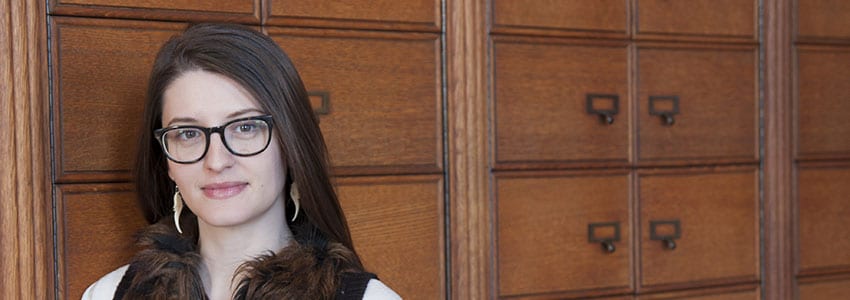Graduate students know the critical need for funding, but few can hold a candle to the urgency experienced by Luciana.
“I came to Michigan from Romania with my parents in 1999. They wanted more for me than what Romania seemed to offer at the time. I finished high school at Pontiac Northern High School and studied History as an undergrad at U-M. As a first generation college student and immigrant, I took advantage of every opportunity the University had to offer. I was an honors history student, spent a semester abroad in Poland, I was involved with the European Student Association and the Center for Eastern European Studies and volunteered at the Washtenaw County Service Center.” Her love for research was cultivated while participating in the Undergraduate Research Opportunity Program (UROP) and after she graduated, she stayed on full-time with UROP.
Growing up in an industrial Romanian town that struggled with post-socialist transformation and her experience as a first generation immigrant in the Metro Detroit area shaped her interests into race formation in the context of urban transformation and industrial collapse. She returned to U-M for a Ph.D. in the Joint Program in Anthropology and History and to further explore these interests. During this time she also completed the Museum Studies Graduate Certificate. “I loved my MSP cohort – we were a very interdisciplinary group and, while it was challenging at times, it was really rewarding to engage in conversations with people from very different backgrounds and with competing viewpoints. Michigan is amazing this way.”
Her dissertation research examines the relationship between socialist factory life and contemporary approaches to transformation in a Romanian community. “I argue that people’s understanding of post-socialist transformation is directly linked to the surrounding socialist built spaces and their material characteristics which leads to numerous contradictions in the processes of change.” She completed her dissertation research in her home country of Romania. “It was harder to do research there than I expected. I wasn’t a local anymore, but I wasn’t a foreigner either and people didn’t understand why America was interested in them or why they sent me there,” she says smiling. Although her research is grounded in post-socialist Europe, she hopes to open conversations about industrial collapse and factory sociality across political and geographical boundaries and to think critically about what is at stake when we look to transform communities around the world.
Among many research and writing fellowships, Luciana received emergency funds while she was conducing her fieldwork. “Rackham saved my life, quite literally” she explains. While doing field research in Romania, she encountered unexpected complications during her pregnancy. “If I hadn’t had emergency Rackham funding for private medical care, chances are I would have died giving birth to my daughter.”
After completing her doctorate, she hopes for a job that combines program administration, service and teaching. She’s been heavily involved in programs throughout her years at U-M. Luciana currently mentors students in the Undergraduate Research Opportunity Program (UROP) for the library system and works at Rackham in the Graduate Student Success office, helping with the Rackham Summer Institute (SI).
When she is not working on her dissertation, she spends her time exploring nature and everything Ann Arbor has to offer with her daughter, Aida.

